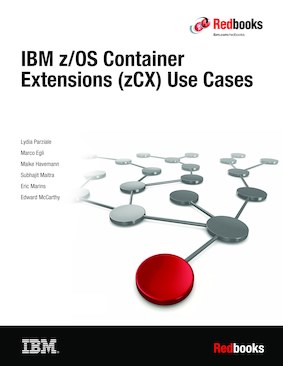Related video
0
Abstract
Is it time for you to modernize your IBM® z/OS® applications to allow for access to an entire system of open source and Linux on IBM Z® workloads? Is co-location of these workloads on the z/OS platform with no porting requirements of value to you?
Your open source or Linux on IBM Z software can benefit from being co-located and managed inside a z/OS environment; leveraging z/OS quality of service for optimized business continuity.
Your software can be integrated with and can help complement existing z/OS workloads and environments. If your software can communicate with z/OS and external components by using TCP/IP, now is the time examine how IBM z/OS Container Extensions (IBM zCX) makes it possible to integrate Linux on Z applications with z/OS.
This IBM Redbooks® publication is a follow-on to
We start with a brief overview of IBM zCX. In Part 1, “Integration” on page 9, we demonstrate use cases that integrate with zCX. In Part 2, “DevOps in zCX” on page 165, we describe how organizations can benefit from running a DevOps flow in zCX and we describe the set up of necessary components. Finally, in Part 3, “Monitoring and managing zCX systems” on page 229, we discuss IBM Service Management Unite Automation, a free-of-charge customizable dashboard interface and an important discussion of creating the suitable container restart policy.
Table of Contents
Chapter 1. IBM z/OS Container Extensions overview
Part 1. Integration
Chapter 2. Apache Kafka and ZooKeeper
Chapter 3. IBM App Connect Enterprise
Chapter 4. IBM Aspera fasp.io Gateway
Chapter 5. Using IBM MQ on zCX as a client concentrator
Part 2. DevOps in zCX
Chapter 6. DevOps overview
Chapter 7. Using Gitea as a code repository
Chapter 8. Using Jenkins to automate builds
Chapter 9. Using Ansible to automate deployment and tests
Chapter 10. Putting it all together and running the pipeline
Part 3. Monitoring and managing zCX systems
Chapter 11. Monitoring
Chapter 12. Container restart policies
Appendix A. Additional material
